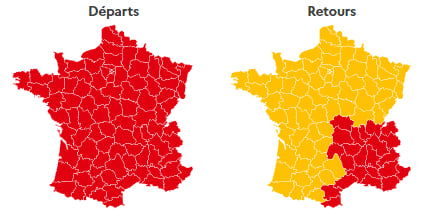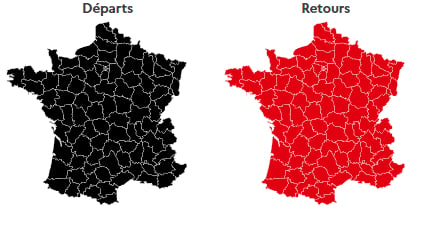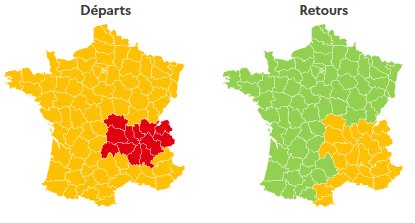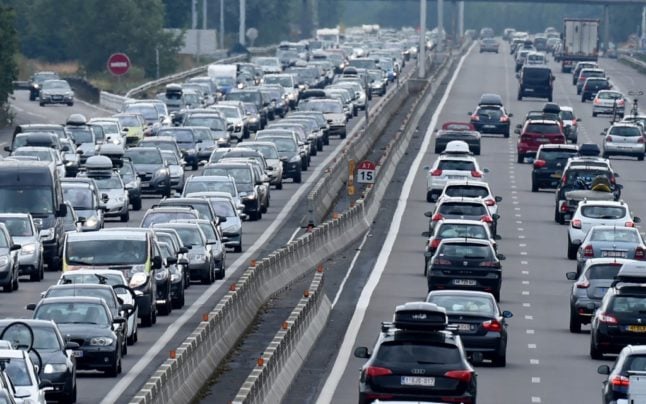Traffic forecaster Bison futé has issued a ‘black’ alert for heavy traffic. Meanwhile, train operator SNCF is bracing for its busiest period of the year. Some 400,000 passengers expected to travel on main lines on Friday, and reservations for the summer are already 10 percent higher than the record-breaking level for the summer of 2019.
This weekend alone, one million travellers are expected to take a train in France, and a third of the 650 TGV Inoui and Ouigo running each day (on 800 mainline trains) are full.
“We’re doing what we always do, but the trains are fuller and we’re distributing luggage tags to avoid forgotten luggage,” an SNCF Voyageurs spokeswoman told AFP.
The most popular rail destinations this summer are, unsurprisingly, the Mediterranean, the south-west and Brittany, with the “top five” most popular cities being, as last year, Paris, Lyon, Bordeaux, Marseille and Avignon. The east of France is also popular this year, with notable increases in bookings to Nancy (+56 percent over one year), Metz (+50 percent) and Reims (+63 percent).
While travel on French roads is classed as “difficult” or “very difficult” on Friday – orange and red on Bison Futé’s four-colour alert system – Saturday is classed as “extremely difficult” – or black on its colour system, its highest alert level.
Traffic difficulties are expected throughout the weekend, in the south-east and along the Mediterranean Arc as holidaymakers head to popular resorts. Jams are also predicted on the A20, A71 and A75 in central regions; and on the A61, A62 and A63 in the south-west, as well as the A10.
Meanwhile, the A7 in the Auvergne-Rhône-Alpes, and the A61 and A62 in south-west France will be busy as holidaymakers head back home; and traffic will be difficult on the A8 and A9 freeways, on the coast from the Italian border to the Spanish border.
More specifically, on Friday, Bison Futé urges drivers heading off on holiday to avoid:

- travel in the Île-de-France after 12noon;
- the A1 between Paris and Senlis from 5pm to 7pm;
- the A10 between Orleans and Poitiers from 8am to 8pm, and between Poitiers and Bordeaux from 11am to 5pm;
- the A63 between Bayonne and Spain from 9am to 8pm;
- the A6 between Beaune and Mâcon from 11am to 7pm;
- the A7 between Lyon and Orange from 11am to 9pm and between Orange and Marseille, from 1pm to 8pm;
- the A8 between Aix-en-Provence and Fréjus from 2pm to 8pm, and between Cannes and Italy from 8am to 6pm;
- the A20 between Limoges and Brive-la-Gaillarde from 2pm to 6pm;
- the A62 between Bordeaux and Toulouse from 2pm to 7pm;
- the A61 between Toulouse and Carcassonne from 4pm to 6pm;
- the A42 between Lyon and Pont-d’Ain from 9am to 1pm;
- the A43 between Lyon and Chambery from 4pm to 7pm; the Mont-Blanc tunnel in the direction of Italy from 10am to 7pm.
Those heading away from France’s main resorts back home should:
- return to or cross the Ile-de-France before 2pm;
- avoid the A63 between Spain and Bayonne from 5pm to 7pm;
- avoid the A6 between Lyon and Beaune from 1pm to 6pm;
- avoid the A7 between Marseille and Orange from 8am to 8pm, and between Orange and Lyon from 9am to 8pm;
- avoid the A8 between Italy and Fréjus from 10am to 8pm, and between Fréjus and Aix-en-Provence from 8am to 8pm;
- avoid the A9 between Narbonne and Orange from 4pm to 7pm;
- avoid the A62 between Toulouse and Agen from 2pm to 8pm;
- avoid the Mont-Blanc tunnel heading into France, from 4pm to 6pm.
Saturday, July 30th, will be the busiest day of the weekend for travel on French roads. Bison Futé has the following advice for drivers on outward journeys:

- leave or cross the Île-de-France after 12noon;
- avoid the A13 between Rouen and Caen from 9am to 4pm,
- avoid the A11 between Paris and Angers from 10am to 12pm,
- avoid the A10 at the Saint-Arnoult-en-Yvelines toll area from 6am to 1pm; between Orleans and Poitiers from 8am to 5pm; between Poitiers and Bordeaux from 9am to 12pm,
- avoid the A63 between Bordeaux and Spain from 10am to 7pm,
- avoid the A7 between Lyon and Orange from 7am to 6pm; and between Orange and Marseille, from 8am to 8pm;
- avoid the A8 between Aix-en-Provence and Fréjus, from 8am to 8pm and between Cannes and Italy, from 10am to 12pm;
- avoid the A9 between Montpellier and Narbonne, from 9am to 12pm;
- avoid the A20 between Limoges and Brive-la-Gaillarde, from 8am to 7pm;
- avoid the A71 between Orleans and Bourges from 9am to 11am; and Bourges and Clermont-Ferrand, from 9am to 1pm;
- avoid the A75 between Clermont-Ferrand and Lodève, from 10am to 4pm;
- avoid the A750 between Lodève and Montpellier, from 11am to 1pm;
- avoid the A62 between Agen and Toulouse, from 9am to 5pm;
- avoid the A61 between Toulouse and Narbonne, from 10am to 3pm;
- avoid the Mont-Blanc tunnel in the direction of Italy, from 10am to 7pm (waiting time greater than 1 hour).
For motorists on homeward journeys, the advice from France’s traffic watchdog is:
- return to or cross the Ile-de-France before 2pm;
- avoid the A13 between Caen and Rouen from 12pm to 2pm;
- avoid the A11 between Angers and Le Mans from 10am to 2pm;
- avoid the RN165 between Lorient and Nantes from 11am to 1pm;
- avoid the A10 between Bordeaux and Poitiers from 9am to 2pm;
- avoid the A7 between Marseille and Orange from 9am to 2pm; and between Orange and Lyon, from 9am to 7pm;
- avoid the A8 between Italy and Fréjus from 10am to 12pm; and between Fréjus and Aix-en-Provence, from 9am to 2pm;
- avoid the A62 between Toulouse and Bordeaux from 10am to 5pm;
- avoid the Mont-Blanc tunnel in the direction of France from 4pm to 6pm (waiting time greater than 1 hour).
Travel on Sunday is forecast to be comparatively easier. Bison Futé has labelled most of the country as yellow – “difficult” – with the Auvergne-Rhône-Alpes region classed as red – “very difficult” in the direction of resorts.

But it still lists the following stretches of French roads to avoid on outward journeys:
- Major routes in Île-de-France after 7am;
- the A10 at the Saint-Arnoult-en-Yvelines toll area from 9am to 12pm; and between Orléans and Bordeaux from 9am to 5pm;
- the A63 between Bayonne and Spain from 11am to 4pm;
- the A7 between Lyon and Orange from 7am to 8pm; and between Orange and Marseille from 9am to 9pm;
- the A8 between Aix-en-Provence and Fréjus from 8am to 8pm; and between Cannes and Italy from 5pm to 8pm;
- the A9 between Orange and Narbonne from 9am to 6pm;
- the A20 between Limoges and Brive-la-Gaillarde from 11am to 9pm;
- the A62 between Agen and Toulouse from 11am to 9pm;
- the A61 between Toulouse and Narbonne from 9am to 5pm;
- the Mont-Blanc tunnel in direction of Italy from 10am to 5pm (waiting time higher than 30 min).
Meanwhile, holidaymakers heading home should:
- return to or cross Ile-de-France before 2pm;
- avoid the A10 between Bordeaux and Saintes from 10am to 5pm,
- avoid the A7 between Marseille and Orange from 10am to 7pm; and between Orange and Lyon, from 11am to 7pm,
- avoid the A8 between Italy and Cannes from 10am to 12pm; and between Fréjus and Aix-en-Provence, from 9am to 7pm;
- avoid the A9 between Narbonne and Orange from 11am to 8pm;
- avoid the A62 between Toulouse and Agen from 11am to 7pm;
- avoid the A61 between Narbonne and Carcassonne from 11am to 7pm;
- avoid the Mont-Blanc tunnel in the direction of France from 3pm to 6pm (wait more than 1 hour).
Looking further ahead, Bison Futé predicts that travel will be busy every weekend throughout August, although not quite to the extent of the crossover weekend.



 Please whitelist us to continue reading.
Please whitelist us to continue reading.
Member comments